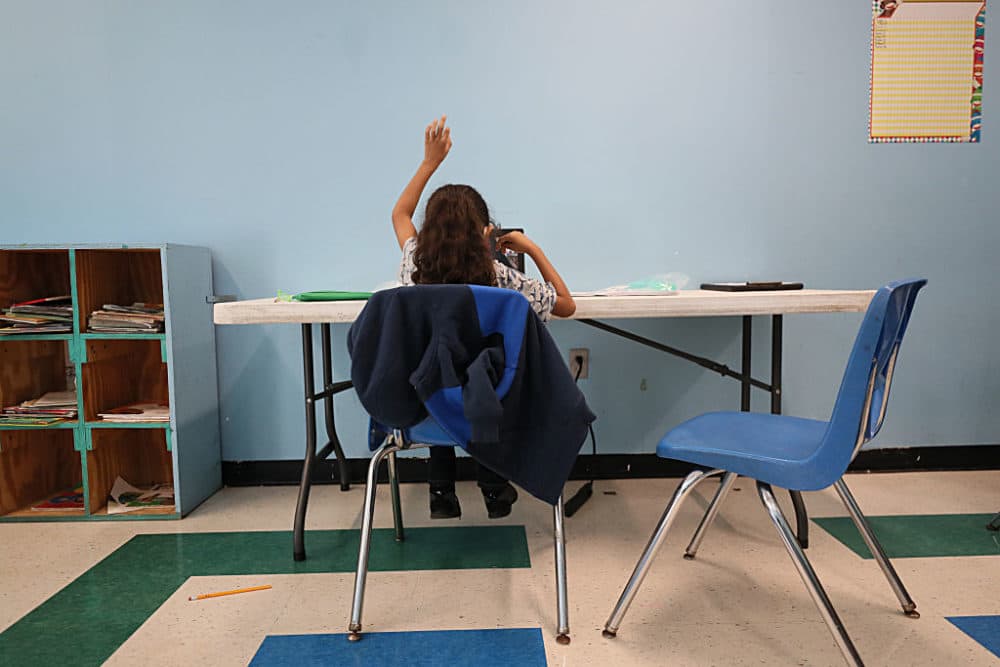Advertisement
Report: Future Of Education Lies In Community Collaboration

The last year has profoundly changed education from the COVID-19 pandemic to rising political tensions and growing movements for racial justice.
Among the many lessons during the historic year, this year’s annual Condition of Education report from the Rennie Center, a research and policy think tank, highlighted just how much communities rely on their education systems. In addition to basic learning, public schools fill a variety of needs for children like food security, technology access and mental health services.
The Condition of Education report focused on one simple principle this year for improving education in the commonwealth: involve the community.
"Districts have never been more engaged with families because of the crisis," Commissioner of the Department of Elementary and Secondary Education Jeffrey Riley said during a roundtable discussing the Rennie Center's report. "Parents have always been the sleeping giant in education. We've woken them up and if we can keep them engaged we can dramatically improve outcomes for our kids going forward."
About 20% of Massachusetts parents said they were actively supplementing their child's educational experience by incorporating their own projects, according to a survey conducted by MassINC Polling Group in June. When broken down by racial demographics, the analysis indicates that 30% of Asian parents and 24% of African American parents were adding in educational material to their child's assigned school work. Nineteen percent of white parents reported doing the same.
The Rennie Center report also focuses on what it says should be three priority areas, the first being holistic learning.
The Rennie Center argues that academics must be paired with non-academic supports to help a student thrive, pointing to Framingham Public Schools as an example.
That district, which serves a diverse community of students and families, recently created an office of Community Resource Development which hosts monthly meetings bringing together community partners and school staff to look at student and district level data. From there, the group creates responsive programming that the Framingham community actually needs.
Through these collaborations, the district has been developing programs that fit the needs of all of its students, from infant-toddler programs for elementary school grades to an after-school program that focuses on STEM curriculum for 6th – 8th graders. The district also has a life resiliency program for high school students and above, which includes a high school credit recovery options and adult community education services.
The Rennie Center's data dashboard highlighted the rates of homelessness among students. About 2.6% of Massachusetts Students were homeless in 2020, up from 2.2% (or about 3,700 students) in the 2015-2016 school year.
The dashboard also indicated that Boston, Worcester, and Springfield have the most homeless students enrolled in their public schools. Knowing this information is important because "understanding where homeless students live can help the state, districts, and community groups better provide support services, shelter, food, and safety," the report authors argued.
The Future of Learning report also discussed the principle of shared leadership. When it comes to policy making inside a district, the report's authors argue that school leaders should be including a wide variety of stakeholders, from parents to community organization and even students.
A state-wide school climate survey given to eighth graders from the Massachusetts Department of Elementary and Secondary Education indicates that schools in the state had been performing pretty well in terms of making families feel respected. In 2019, about 85% of students said that their parents either always or mostly feel respected at parent-teacher conferences and open houses. For those that responded "mostly untrue" or "never true" the data showed that African American and Latinx students (19% and 17% respectively) reported feeling that way more often than the general population (15%).
But school systems need more than just numbers to make effective policies. “A parent can provide insight into what social-emotional supports their child needs, a soccer coach can share whether their players are coming to practice hungry, a YMCA program manager can share their successful outreach techniques for disengaged students—and that is just the tip of the iceberg,” the report said.
The report highlights the process that officials at Chelsea Public Schools went through in its recent school improvement process. When beginning the process, district leaders gathered stories from families and worked to build authentic relationships with them. From there, the district created teams of educators and families that could propose small but meaningful changes to the school system.
The final priority area the report highlighted was the idea of providing students with multiple pathways to career success. The report authors focused on what they called “two generation support” which offers students, especially in higher education, a combination of programming like childcare, family-based housing and paid internship opportunities.
“Facilitating the success of student parents can lead to higher earnings: research has shown that among single mothers, who make up over half of all student mothers, those with associate degrees who work full-time, year-round, earn $330,000 more in their lifetimes than they would have with only a high school diploma,” the report said.
On a state policy level, the report authors urged lawmakers to invest more in local community collaboration efforts and then elevate examples of success. The Student Opportunity Act does include a $10 million pool of funding to support innovative learning models. The report authors argue the state should focus on how some of that funding can be used to invest in more community-school partnerships.
